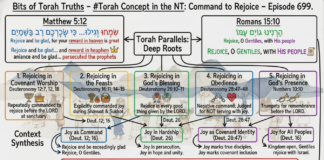This weeks reading is from Parashat Ki Tisa (Shemot / Exodus 30:11-34:35), the Lord instructs Moshe to take a census of the people (30:12) and each person is to give a ransom (half shekel) to the Lord. Moshe instructs to make the bronze laver between the altar and the tent of meeting (30:17-18). Incense for the Tabernacle and its services is prepared (30:23-33). The incense is to be used only for the temple service, anyone using it for any other purpose is to be cut off (30:35-38). Moshe goes up on the mountain and the people ask Aaron to make gods for them to worship (32:1-6). God informs Moshe the people have sinned making themselves a molten image. The Lord God then desires to kill the people for their sins but Moshe reminds the Lord of the covenant promises He had made to Abraham, Isaac, and Jacob (32:7-13). Moshe descends from the mountain seeing the people’s sin, he destroys the two tablets of God’s Commandments (32:14-19). Moshe instructs the Levites to kill those who were responsible (32:23-28). Moshe tells the people to consecrate themselves as he returns to the mountain to make atonement for their sins (32:29-34). As a result of the sin, Moshe set up the Tabernacle outside of the camp of Israel and called the place the “Tent of Meeting” (Ohel Moed, אֹהֶל מוֹעֵד, 33:7). Moshe asks to see the presence of the Lord (33:12-18) and the Lord shows him His glory and declares that He is, “merciful, gracious, slow to anger, loving, and having grace forgiving iniquity, transgression, and sin for thousands” (34:6-7). God commands that the Pesach festival is to be observed. The first fruits of the ground are to be brought into the house of God and a young goat is not to be boiled in its mother’s milk (34:26).
כתבי הקודש / The Holy Scriptures
ספר שמות פרק לב
יד וַיִּנָּחֶם יְהוָֹה עַל-הָרָעָה אֲשֶׁר דִּבֶּר לַעֲשֹוֹת לְעַמּוֹ: טו וַיִּפֶן וַיֵּרֶד מֹשֶׁה מִן-הָהָר וּשְׁנֵי לֻחֹת הָעֵדֻת בְּיָדוֹ לֻחֹת כְּתֻבִים מִשְּׁנֵי עֶבְרֵיהֶם מִזֶּה וּמִזֶּה הֵם כְּתֻבִים: טז וְהַלֻּחֹת מַעֲשֵֹה אֱלֹהִים הֵמָּה וְהַמִּכְתָּב מִכְתַּב אֱלֹהִים הוּא חָרוּת עַל-הַלֻּחֹת: יז וַיִּשְׁמַע יְהוֹשֻׁעַ אֶת-קוֹל הָעָם בְּרֵעֹה וַיֹּאמֶר אֶל-מֹשֶׁה קוֹל מִלְחָמָה בַּמַּחֲנֶה: יח וַיֹּאמֶר אֵין קוֹל עֲנוֹת גְּבוּרָה וְאֵין קוֹל עֲנוֹת חֲלוּשָׁה קוֹל עַנּוֹת אָנֹכִי שֹׁמֵעַ: יט וַיְהִי כַּאֲשֶׁר קָרַב אֶל-הַמַּחֲנֶה וַיַּרְא אֶת-הָעֵגֶל וּמְחֹלֹת וַיִּחַר-אַף מֹשֶׁה וַיַּשְׁלֵךְ מִיָּדָו אֶת-הַלֻּחֹת וַיְשַׁבֵּר אֹתָם תַּחַת הָהָר:
Shemot / Exodus 32:14-19
32:14 So the Lord changed His mind about the harm which He said He would do to His people. 32:15 Then Moses turned and went down from the mountain with the two tablets of the testimony in his hand, tablets which were written on both sides; they were written on one side and the other. 32:16 The tablets were God’s work, and the writing was God’s writing engraved on the tablets. 32:17 Now when Joshua heard the sound of the people as they shouted, he said to Moses, ‘There is a sound of war in the camp.’ 32:18 But he said, ‘It is not the sound of the cry of triumph, Nor is it the sound of the cry of defeat; But the sound of singing I hear.’ 32:19 It came about, as soon as Moses came near the camp, that he saw the calf and the dancing; and Moses’ anger burned, and he threw the tablets from his hands and shattered them at the foot of the mountain. (NASB)
In the Scripture reading for this week we read יט וַיְהִי כַּאֲשֶׁר קָרַב אֶל-הַמַּחֲנֶה וַיַּרְא אֶת-הָעֵגֶל וּמְחֹלֹת וַיִּחַר-אַף מֹשֶׁה וַיַּשְׁלֵךְ מִיָּדָו אֶת-הַלֻּחֹת וַיְשַׁבֵּר אֹתָם תַּחַת הָהָר: 32:19 It came about, as soon as Moses came near the camp, that he saw the calf and the dancing; and Moses’ anger burned, and he threw the tablets from his hands and shattered them at the foot of the mountain. (NASB) The Hebrew text says וַיִּחַר-אַף מֹשֶׁה “Moshe’s nose was quick/hasty/hurried” which is translated to mean “Moshe’s anger burned.” King Solomon said in Mishley / Proverbs 14:17 A quick-tempered man does foolish things, and a crafty man is hated. (NIV) Here, on seeing their sin, Moshe sent the tablets forth from his hand throwing them down and shattering them at the foot of the mountain. In his anger, Moshe did a hasty thing and destroyed the commandments of the Lord. The Scriptures say טז וְהַלֻּחֹת מַעֲשֵֹה אֱלֹהִים הֵמָּה וְהַמִּכְתָּב מִכְתַּב אֱלֹהִים הוּא חָרוּת עַל-הַלֻּחֹת:, 32:16 The tablets were God’s work, and the writing was God’s writing engraved on the tablets. (NASB) The Lord God made and wrote on these tablets with His own finger. Anger is a violent passion of the mind excited by a real or supposed injury and is accompanied with a propensity to take vengeance, or to obtain satisfaction from the offending party. In His anger, Moshe cast off the tablets and broke them to pieces. The Apostle James wrote in James 1:20 For the anger of man does not produce the righteousness of God. (ESV) These Scriptures show us how easy it is in our anger to stray from the righteousness of God. Bamidbar / Numbers 23: 19 says “God is not a man, that He should lie, Nor a son of man, that He should repent; Has He said, and will He not do it? Or has He spoken, and will He not make it good?” (NASB) Praise the Lord that He is not a man and that He is “merciful, gracious, slow to anger, loving, and having grace forgiving iniquity, transgression, and sin for thousands” (34:6-7). In His mercy and grace He sent His Word into this World as His Son Yeshua the Messiah to make atonement for our sins! So if we sin in our anger, we have an advocate who pleads our case before the Father. (1 John 2:1) Indeed we serve a wonderful God!








